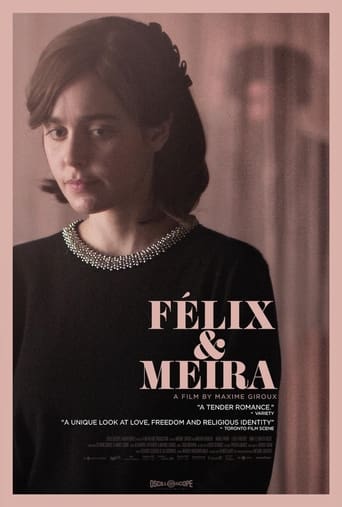Maria Golumbovska
It is always good to be able to define yourself. Even if traditions contradict your mind. In this film I saw the case when traditions are evil that rules over weak people. ....and love is not a tradition, it is a decision, not possible without knowing yourself. I like enormously the film, three main actors played excellent. What impressed me a lot were two sequences: the first one - the conversation between а "tradition man" Luzer Twersky and а "non tradition man" Martin Dubreuil; and the second one - when a "tradition man" broke his tradition listening to the song "After Laughter "after his wife left him.
jakob13
Maxime Giroux's 'Felix and Meira' tone is set from the very first frame, captured in black and white. Malka or Meira plays with her soup with a soup spoon, a Shabbos meal. Her husband with finely curled ear locks, wearing a black hat trimmed in sable, and wearing a long black silk coat celebrates the Sabbath with gusto, in song and food and the pouring of wine. Meira feels estranged from this world of ultra Orthodox Jews, living in Montreal. A community that keeps very much to itself; insulated religiously in a world of Yiddish and Hebrew, prayers and rituals. A world in which husband and wife sleep in separate beds, according to tradition; coitus takes place only during days of ovulation; menstruation renders her impure, a ritual bath cleanses her. Malka wears a wig, long garments, She has but one duty to bear her husband many children. She doesn't; after the birth of her daughter she takes up pen and notebook to draw; she has a certain talent. She likes music which her husband forbids. She's listless and wanders aimlessly in her mind. In secret, she takes birth control tablets, for she doesn't want more children. And into her universe comes a secular man, an artist of sorts, a lost soul who feels empty because a strict father has never shown him love or interest since he didn't follow in the man's footsteps, it's inferred. So Felix travels and is now back in his own flat in Montreal, perhaps in Westmount, a Jewish enclave of Anglophone Jews. And as the narrative develops these two souls collide and a desperate, quite love arises between them. Too, late Meira's husband declares his love for her, but she is beyond his pleas for she has left an tradition from which she cut herself off and can never return. (Woody Allen treats the theme but without tragedy in 'Fading Gigolo', and Boaz Yakin treated seriously in the 1998 film 'A Price Above Rubies', with more or less the same outcome as Giroux's film.) The closing scenes are shot in Venice, on a grey day. A in an aside, Meira wishes regrets she has taken her daughter out of structured community, for life with her and Felix. Felix stolidly stares into the mournful cast of Venetian light. The pairing will never be happy, but, it is suggested, that in desperation they will cling to each other.
David Ferguson
Greetings again from the darkness. This movie is filled with quiet and stillness. Maybe moreso than any movie I can recall. With a backdrop of Montreal, New York and Venice, and a theme of forbidden love and self-discovery, the quiet of the actors belie the undercurrent of emotion driving the three leads.Meira (Hadas Yaron) is a Hasidic Jew living with her husband Shulem (Luzer Twersky) and their toddler daughter within an Orthodox community where women are forbidden from listening to "outside" music, creating art, or even looking men directly in the eye. Their mission in life is to serve their husband, have lots of babies, and respect the religion. While many women in the community seem fine with their lot, Meira hides records under the sofa, draws pictures in a pocket-sized notebook, and longs for the excitement and color of the real world.One day, by happenstance, the paths of Meira and Felix (Martin Dubreuil) cross in a neighborhood corner store. He compliments her on her drawing, as she tries to ignore him. By the time they next meet, we have witnessed the painful bedside farewell of Felix to his dying father. It's difficult to tell which is the stronger emotion here – guilt or grief.Soon enough Felix and Meira are finding ways to meet, but there is no crazed display of passion between the two. There is a devastating scene as Felix patiently waits while Meira musters the courage to actually look into his eyes. It's like 50 Shades of Restraint. It turns out, for different reasons, these two lost souls share a common bond of loneliness. Meira's individuality and creativity are stifled by religious oppression, while Felix is coming to grips as the black sheep of a family that no longer exists. When Felix says of his father, "He hated me to death. And then he died.", we understand it's the missed opportunity that weighs on him more than the passing of a long-lost parent.Music plays a vital role in how director Maxine Giroux presents the characters and the story. Wendy Rene's "After Laughter Comes the Tears" is used beautifully, as is Leonard Cohen's "Famous Blue Raincoat". Heck, even a mousetrap becomes music to the desperate ears of Meira. As stated before, the film is incredibly quiet, and I challenge any movie lover to come up with a more painful argument than the one featuring Meira and Shulem whispering at each other from separate beds, or a more powerful scene with fewer spoken words than Shulem and Felix at the kitchen table. On the bright side, watching her walk around in her first ever pair of jeans is a freeing sight to behold.Mr. Giroux presents something very real, yet outside the bounds of what cinema usually brings when forbidden love, religion, loneliness and grief are involved. Ms. Yaron delivers an astounding performance, and it's little wonder this has been such a hit on the festival circuit.
Albert Ohayon
I was completely blown away by this unique film. It is a gentle, nuanced look at two people from very different communities who connect and fall in love. The young woman is from the Hassidic community in Montreal. She is questioning her life and the limitations imposed on her by her community. The man she meets is not from her community and at a crossroads in his life. While this premise might seem implausible, it is explored with subtlety and respect. I cannot forget to praise the terrific performances of the three main actors. Israeli actress Hadas Yaron is simply amazing as Meria, the young Hassidic woman who is stifling in her marriage and community. Martin Dubreuil is also very good as Felix who is in search of something but is not quite sure what. All he knows is that he is instantly attracted to the shy, reluctant young woman and he must try to connect with her in any way he can. The chemistry between the two is simply electric. The character of Meira's husband could have easily been portrayed as the clichéd overbearing, uncaring spouse. Instead, actor Luzer Twersky makes him a sympathetic character trapped by his own failings. He simply does not know how to deal with his wife's angst. There are some incredible moments of tenderness in this film (The first time Felix and Meira hold hands is understated but very powerful). Overall this is a beautiful layered love story that is full of hope and happiness. Love will always find a way. Not to be missed. Bravo Maxime Giroux for giving us such a beautiful film.



